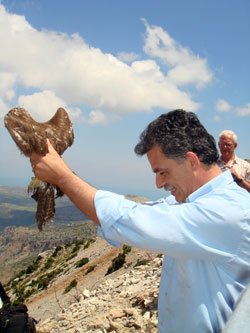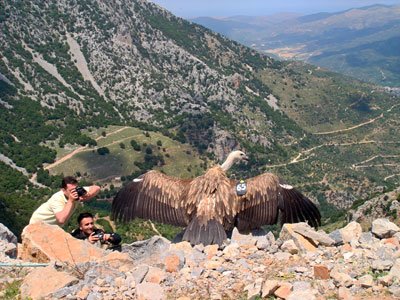Flight to freedom for birds of prey in Crete
 On Tuesday 22 May, the Municipality of Hersonissos, the Natural History Museum and the Aegina Wildlife Hospital freed vultures and other birds of prey in Seli Ambelou (after Kera, near the entrance to the Lassithi Plateau).
On Tuesday 22 May, the Municipality of Hersonissos, the Natural History Museum and the Aegina Wildlife Hospital freed vultures and other birds of prey in Seli Ambelou (after Kera, near the entrance to the Lassithi Plateau).
The Natural History Museum had sent the birds, some wounded by trigger-happy hunters and others poisoned by pesticides, for specialist treatment at the Aegina Wildlife Hospital. Following their successful rehabilitation, the birds were returned to Crete to be released into the wild in their birthplace.
The Mayor of Hersonissos, Mr Danelis (photo left), said that “This was a symbolic event, giving the audience an indescribably wonderful feeling. We want Crete to be considered a welcoming island and this is the symbolic meaning of this gesture. Biodiversity is a very important matter and it must be preserved at all costs.”
Representatives of the Natural History Museum and the Aegina Wildlife Hospital made similar comments, stressing the need to protect these rare birds by eliminating the causes of their disappearance, such as unrestricted use of pesticides and hunting by people who know little and care less about the effect of their actions on the balance of nature.
Many families attended the event with small children, who enjoyed the unusual sight and clapped when the wild birds were freed. A similar release of wild birds took place on 20 May in the Forest of Rouvas near Gergeri and Zaros, while there had also been an earlier event on Mt Yiouchtas in Archanes.
The Aegina Wildlife Centre is the first rescue centre for wild animals in the Balkans. It was first established in 1984 and took on its present form in 1990, based in Aegina. It takes in over 3,500 injured, exhausted or poisoned animals a year, mostly protected species. Over half of these are released once they are judged capable of surviving in the wild following treatment. The Centre has contributed to the protection of endangered species with small populations in Greece and/or Europe, and promotes public awareness on Greek wildlife issues and problems. In 1992 it won an award from the Academy of Athens for its actions to conserve the environment and for the voluntary support of its members.

The last vulture to be freed spread its wings and allowed people to admire it before soaring majestically over the mountains of Crete.
Read more: The Bearded Vulture